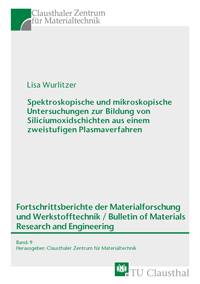Lisa Wurlitzer
Title | Fortschrittsberichte der Materialforschung und Werkstofftechnik / Bulletin of Materials Research and Engineering Spectroscopic and microscopic investigations on the formation of silicon oxide layers from a two-stage plasma process |
| ISBN | 978-3-8440-7810-7 |
| Publication type | dissertation |
| Language: German | German, English |
| Pages | 174 pages |
| Format | 21 x 14.8 cm |
| price | 48,80 € / 61,10 SFr |
| Publication date | 2021 |
| Published by | Shaker publishing house GmbH |
Summary
This dissertation examines a novel process for the deposition of silicon oxide layers by means of a PECVD process using silane. The explosive reaction is prevented by a spatial and temporal separation of the reaction gases in a two-stage process. In the first process step, a silicon nitride layer is applied to the substrate using a SiH4/N2 gas mixture at room temperature by igniting a dielectrically impeded discharge. This coating is oxidized to SiO2 in the second process step by the ignition of oxygen-containing plasma. The subject of this dissertation is the spectroscopic analysis by means of X-ray photoelectron and valence band spectroscopy of the individual process steps as a function of the selected process parameters of partial pressure, treatment duration and discharge characteristics. Furthermore, the dependence on the oxygen source for the oxidation and the influence of these parameters on the surface morphology is considered. Finally, an oxidation mechanism of the deposited silicon nitride layer can be concluded on the basis of these investigations. This is a diffusion-controlled substitution process of nitrogen atoms by oxygen atoms. The rate-determining step is the diffusion of the oxygen atoms through the silicon dioxide layer that builds up. This process results in a three-layer structure, whereby the uppermost layer consists largely of stoichiometric SiO2 with partial intercalation of nitrogen. This is followed by silicon oxynitrides as a transition layer. The bottom layer, which is located directly on the substrate, consists of silicon nitride.
